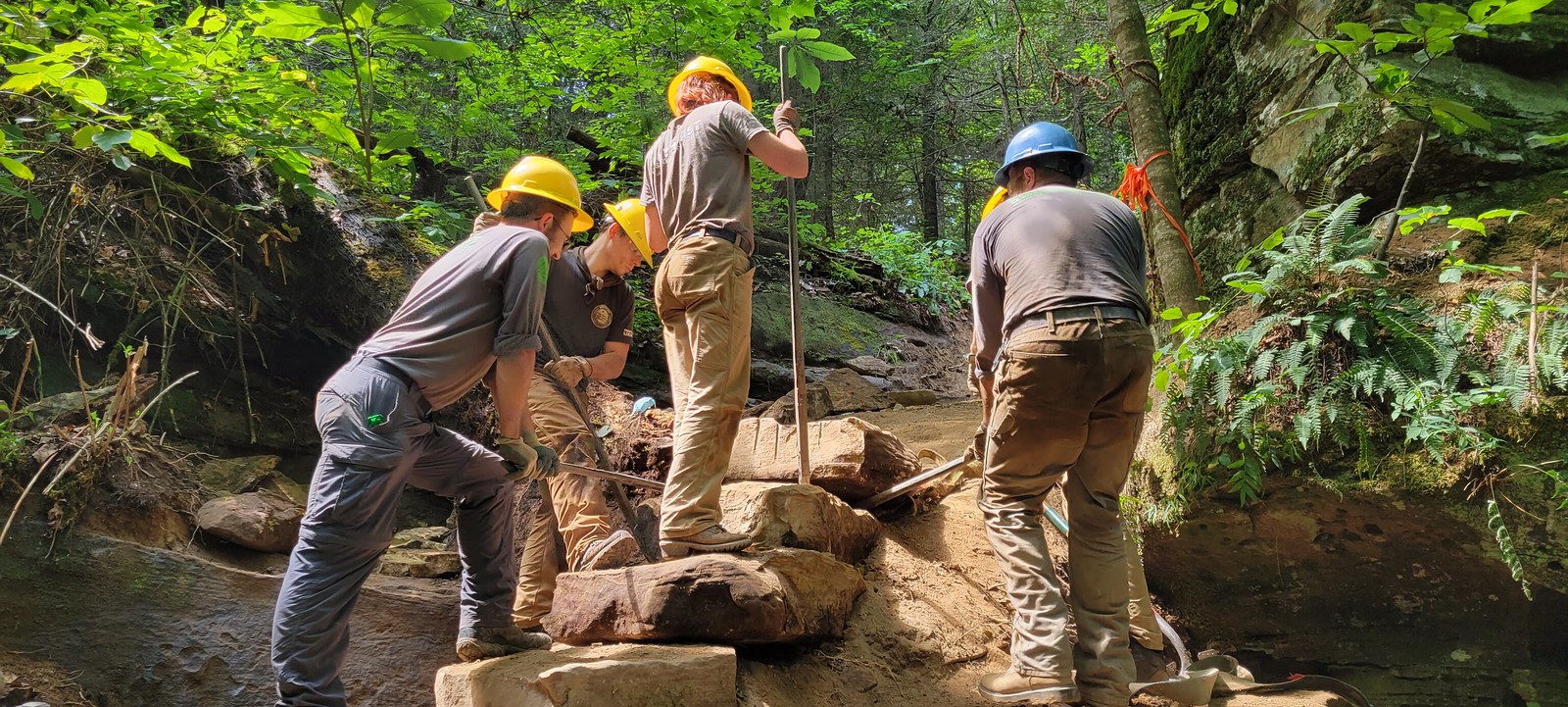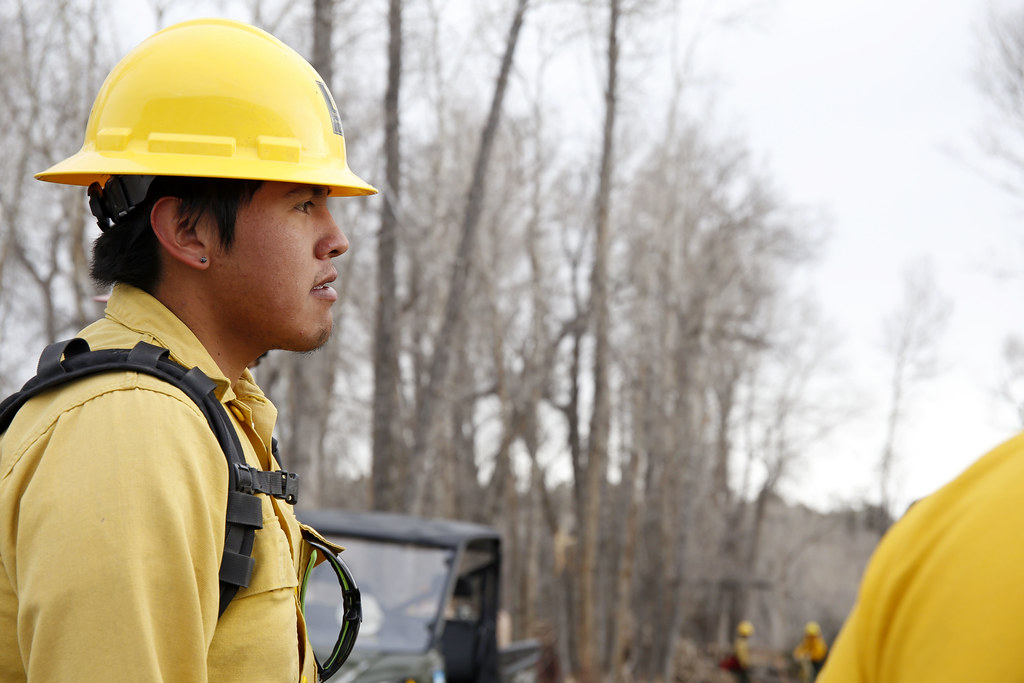Imagine this – it’s your first day as a Conservation Legacy crewmember. You swing on your pack, grab your chainsaw, and fall in step with the rest of your crew. It’s early morning – still dewy and fresh, but you can already feel the hot sun on your back. Worries float through your mind as you hike through the fragrant pines to the work site. Am I strong enough? Did I bring enough food and water? Is that blister coming back? A mild anxiety creeps in. Finally, you and your crew approach the tree line. A huge, rocky peak rises above you. Suddenly, there is a peaceful quiet. Your lungs fill with fresh mountain air. Looking around, you can see for miles. Your crewmates drop their packs, and everyone takes in the view. You feel small but connected, as the vastness of this place settles in. You realize that this project is going to be awesome, and you smile as you get to work.
Nature is central to humans’ wellbeing. Yet, modern society continues to wander farther from it. Days indoors, excessive screen time, desk jobs, lack of physical activity, long commutes; it’s no wonder that one in five people experience mental health illnesses each year, as published by the National Alliance on Mental Illness. This Earth Day, we recognize AmeriCorps members, organizations, and federal land management agencies’ efforts to connect people with nature.
Spending time in nature boosts both physical and mental health. AmeriCorps members and organizations, like Conservation Corps, serve to help improve the accessibility and usability of our recreation areas for more Americans.
Access to safe, local outdoor recreation opportunities is crucial, but the reality is that many do not have this luxury. Conservation corps organizations are uniquely positioned to work with communities to increase outdoor access – particularly in urban areas that have historically lacked access to parks, bike paths, and other outdoor infrastructure. “Your soul or spirit is as important as your physical strength,” says Conservation Legacy chief executive officer, Elwood York. “Our quest at Conservation Legacy is to protect and preserve the Earth, one AmeriCorps member at a time. To find that balance and oneness with our world and to assist in its preservation for generations to come, to explore, to work, and enjoy.”

Conservation corps also offers a team-based experience for crew members where a cohort of peers work together on a range of projects such as trail building, fence construction and maintenance, habitat and watershed restoration, and more. These crews are the backbone that help positively impact the communities with their service. Together they help to maintain hiking trails, mitigate the impact of invasive plants, and repair fences to keep livestock out of protected areas.
And members get as much out of their efforts. Many crew members report the positive impact of the corps experience on their mental health. Camping for extended periods of time, spending long days outside, and working hard are often lauded as having significant impacts on issues like isolation, depression and anxiety.
Lizette Betancourt, an Appalachian Conservation Corps AmeriCorps crew member, shared that she had been experiencing depression for years before joining a crew. “Here, I am past all that,” she said during an interview shortly before finishing her term of service. “I was in a deep hole for a long time. This position has been a big help to fix that.”
Another Appalachian Conservation Corps crew member, Anthony Stazi, explained that joining a crew was the best decision he’d ever made. “Especially for individuals dealing with depression,” he said. “There’s nothing better than getting out into the natural world with cool people. Physical labor, healthy living, working through it all, and building that mental fortitude. It all adds up to be good for mental health.”
Another crew opportunity with Conservation Legacy is the Veterans Fire Corps AmeriCorps. Veterans Fire Corps AmeriCorps crews clear and thin out ‘hazard fuels’ – any living or dead vegetation that is flammable. Using chainsaws and hand tools, crews clear small trees, shrubs, and dead plant matter which can carry fire from the ground into the canopy and ignite deadly ‘crown fires’. Crews also can be mobilized on prescribed burns, and at times, initial fire attack response. Many crew members find the program to be a welcome bridge between their service and civilian life. Traditional jobs tend to lack the structure, camaraderie, and adrenaline rush that veterans experience during their military career, which often leaves them feeling unsatisfied and unfulfilled.

“It’s taken me a long time to find something like this,” said Peter Brogdan, a member of the Veterans Fire Corps AmeriCorps, while clearing ladder fuels in Coronado National Monument in Arizona. “For many of us – for warriors – it’s hard to transition into a behind-the-desk job. I know there are many veterans out there who are looking for something to put themselves into that means something again…And this [work] is really helpful for that.”
AmeriCorps-supported conservation service organizations are leading the charge in the effort to connect people to nature. Conservation Legacy is wholeheartedly committed to this work – from our trail crews to interns to veterans.
Find out more about Conservation Legacy and its programs
Conservation Legacy is a national organization dedicated to supporting locally based conservation service programs. The organization offers a wide variety of opportunities, from internships with land management agencies to conservation crews, to the Veterans Fire Corps AmeriCorps crews, and more.
Working in partnership with state and federal agencies including the National Park Service, US Forest Service, Bureau of Land Management, Americorps, and others, the Veterans Fire Corps AmeriCorps was established in 2009, recruiting recent-era veterans for wildland firefighting opportunities.
Rose Clements is the program communications manager for Conservation Legacy. She joined the Conservation Legacy team with a background in visual communication and conservation. Her life changed when she decided to work for a trail crew in Alaska for a summer. This experience jump started her passion for conservation work and led her to wrangle rattlesnakes (and tourists) during an internship with the NPS, work as a conservation photojournalist, apprentice on an organic farm in California, and install passive and active water harvesting systems in the desert.



